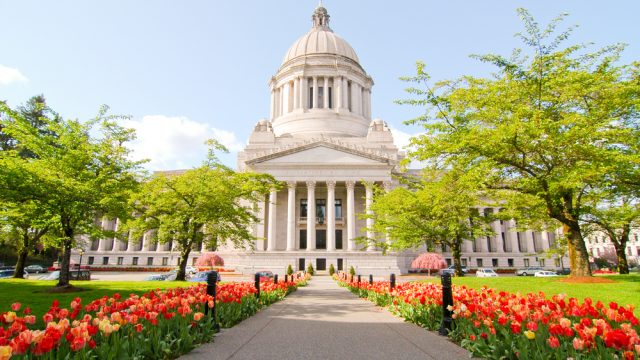Democratic opposition kills aggressive retirement reform in Washington state

PENSION PROBLEMS: Sure, some say Washington state’s pension system is great, but one analyst says the system needs aggressive reforms.
By Dustin Hurst and Shelby Sebens | Northwest Watchdog
A Washington state senator who previously announced his intention to push legislation to move the state’s workers to a 401(k) retirement program has changed his mind, and won’t run the bill due to Democratic opposition.
State Sen. Doug Ericksen, R-Ferndale, confirmed last week that he won’t run his bill to give state workers $10,000 a piece to switch from a taxpayer-guaranteed defined-benefit pension plan to a 401(k) plan, typically known as a defined-contribution plan.
Ericksen’s announcement stems from political opposition from Democrats who rejected the idea of moving government workers to the more fiscally sustainable 401(k) alternative.
For now, Ericksen said he is supporting an effort led by state Sen. John Braun, R-Centralia, to kick Washington’s elected officials off the state’s pension system.
“This is a chance for us to show that we are willing to lead by example,” Braun told Northwest Watchdog.
Opposition to his measure is rather stiff, too, as lawmakers look to hold on to the guaranteed — and often very lucrative — taxpayer-funded pensions.
“You might imagine there are some lawmakers that aren’t thrilled with the idea” Braun said.
No one is certain how the idea will fare in the 60-day legislative session, but a member of Democratic leadership told National Public Radio a few days ago that it’d be “an interesting conversation to have” among lawmakers.
If Washington legislators support Braun’s idea, they would follow in the footsteps of the Oregon Legislature, which ended guaranteed pensions for lawmakers in 2013.
The now-dead Ericksen plan came after Boeing, the aeronautical giant with much of its operations based in the Evergreen State, successfully negotiated a labor agreement that switches some of its workers from pensions to 401(k) retirement plans. Boeing and its machinist unions agreed to the new contract in early January.
His plan would have ended the guaranteed pensions for all new hires and enrolled them in the 401(k) program. Veteran government workers would have had the option to make the switch.
That Democrats successfully blocked the serious pension-reform measure is bad news for Washington taxpayers, who bear the burden of paying for the pension debt.
A State Budget Solutions report released earlier this month revealed that Washington’s pension system boasts a whopping $89 billion in unfunded liabilities — or ongoing debt — according to the group’s calculations. Nationwide, states hold more than $5.1 trillion in total debt.
Cory Eucalitto, a senior analyst with SBS, told Northwest Watchdog on Friday that Washingtonians should be concerned because the pension issue could cut funding for other government services.
“Every extra dollar directed into the pension system because of the state’s failures is a dollar not going towards education, healthcare, and more,” he wrote in an email.
A report released earlier this month by State Budget Crisis Task Force noted that states are having a difficult time coping with the rising cost of pensions as budgets recover from the tax revenue hits they took during the economic downturn of the past decade.
“The costs of pensions and other post-employment benefits generally are growing faster than revenues and continue to crowd out other necessary budget items,” the group, led by former Federal Reserve Chairman Paul Volcker and ex-New York Lt. Gov. Richard Ravitch, warned. “Health care, education, and infrastructure funding are victimized, as is aid to the vulnerable.”
Eucalitto praised Ericksen’s initial idea, but called for the lawmaker to go farther with reform.
“The best option would be to close the defined benefit plans entirely, giving all employees complete ownership of their retirement funds in a defined contribution alternative,” he wrote.
Critics of the SBS report might point to a Pew States study released in 2012 which ranked Washington’s pension system as one of the best in the nation with a 95 percent funding level at the time.
But the Pew report wasn’t all sunshine and roses for the Evergreen State. The document noted that Washington failed to make recommended pension payments between 2005 and 2010.
Eucalitto said the SBS numbers offer a more realistic picture because his group uses more conservative numbers when considering future returns on the investments that fuel the pension system.
“They (Pew) rely on overly optimistic investment return assumptions,” Eucalitto said. “Our calculations, which use a risk-free discount rate that would best protect retirement security, find that Washington pensions are only about 49 percent funded.”
In Olympia, though Ericksen’s plan is down for now, it’s certainly not out. Moving forward, he wants to inform the public about the seriousness of pension issues.
“I think the first thing we are doing is an education campaign,” Ericksen said. “We need to have an apples-to-apples comparison on the data to find out what’s the best interest to the employee and the financial well-being of the state.”
Though more state lawmakers across the country are discussing pension-reform efforts, only governments in Alaska, Rhode Island, Louisiana, Michigan and San Diego, Calif., have transitioned to 401(k) plans successfully , according to Fox Business.
Contact Shelby Sebens at SSebens@Watchdog.org or Dustin Hurst at Dustin@Watchdog.org.
The post Democratic opposition kills aggressive retirement reform in Washington state appeared first on Watchdog.org.







